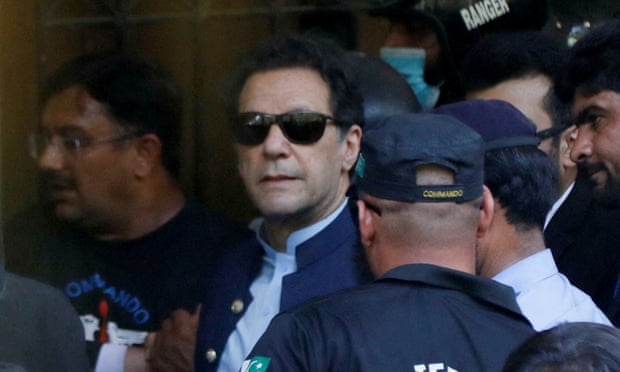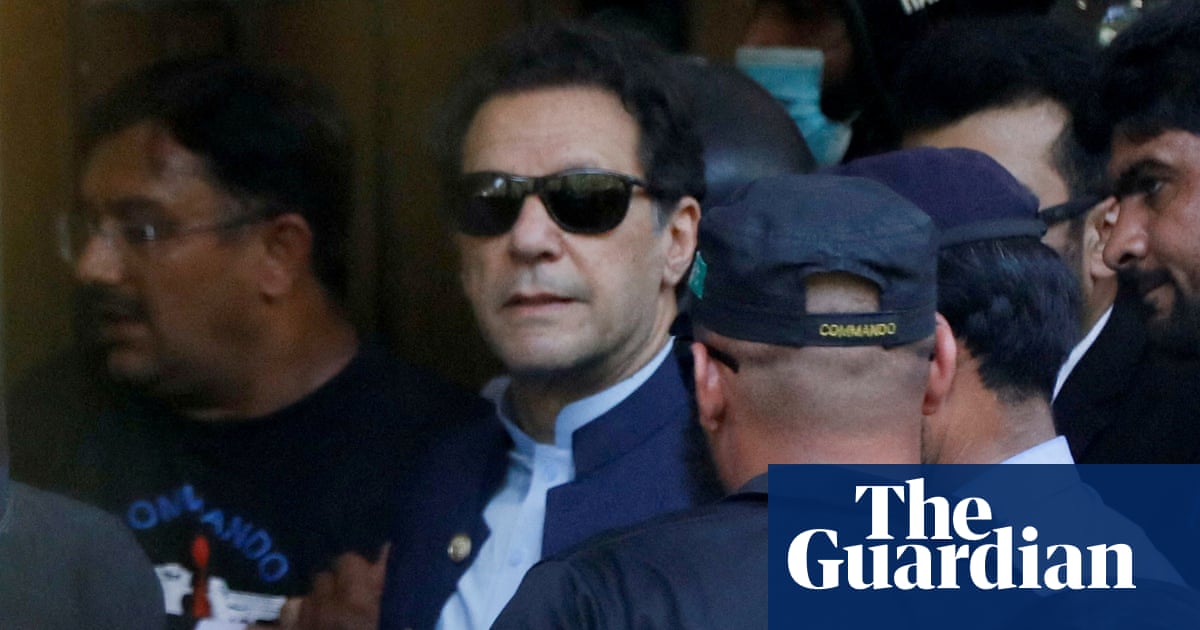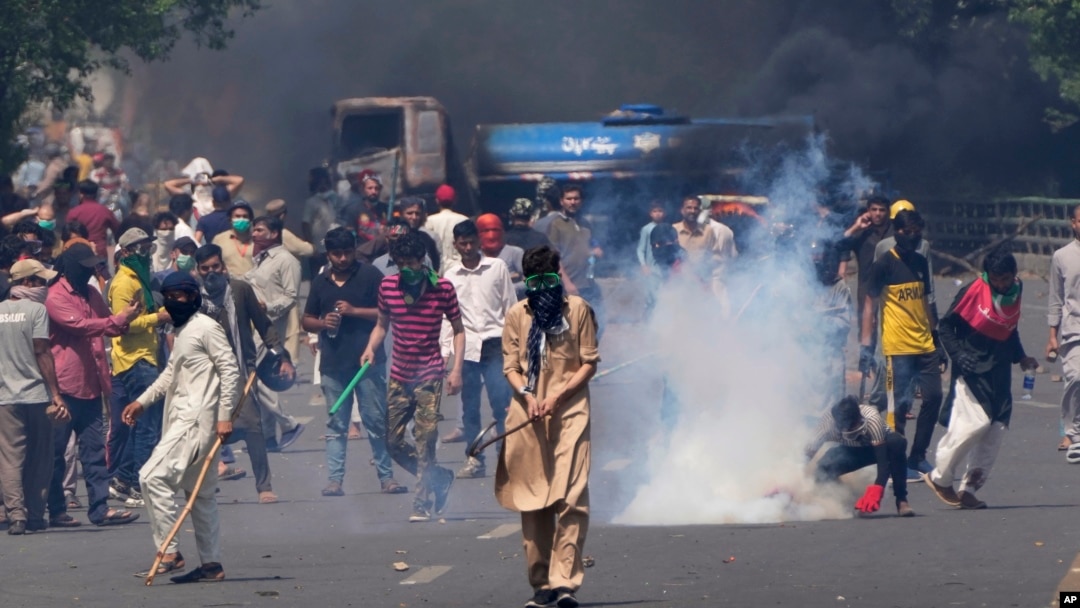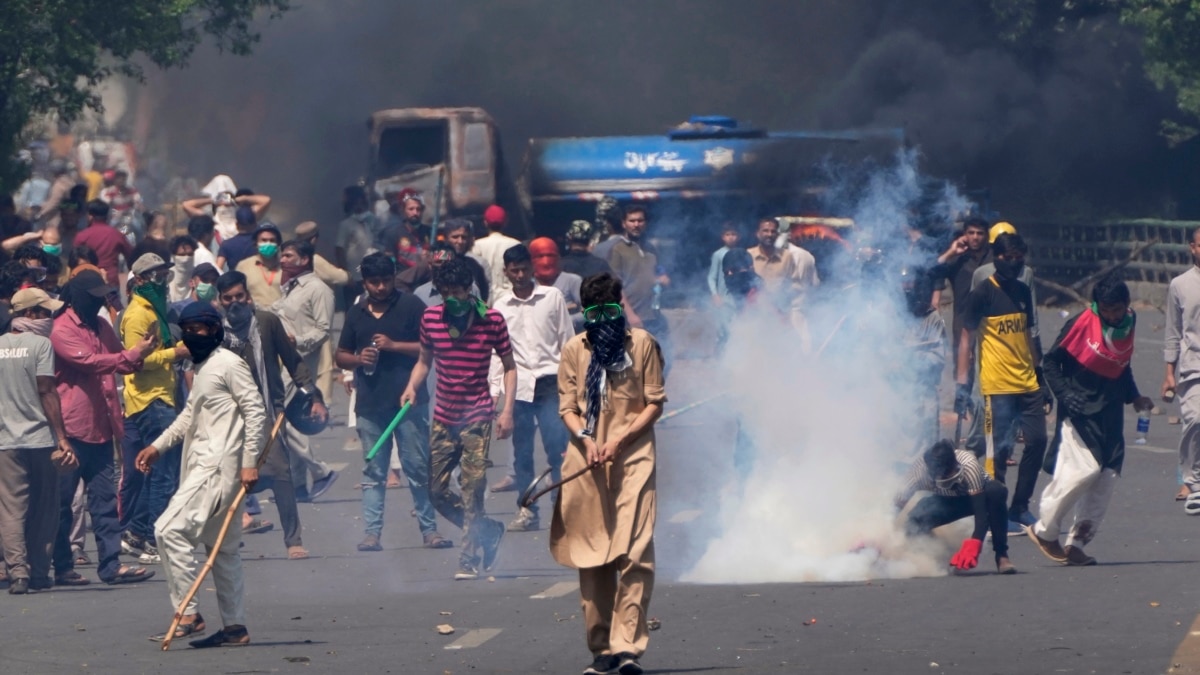mangochutney
FULL MEMBER

- Joined
- May 31, 2022
- Messages
- 1,653
- Reaction score
- -1
- Country
- Location

Pakistan media decry de facto ban on giving airtime to Imran Khan
Journalists say directive on hate speech issued by regulator indirectly affects coverage of former PMBroadcast journalists in Pakistan have decried a de facto ban on mentioning Imran Khan by name or showing his image after a series of directives issued by the country’s media regulator.
Pakistan’s parliament ousted Khan from parliament in April last year. Since then he has been making nearly daily headlines with fiery speeches and tweets directed at the government and army.
In March, the Pakistan Electronic Media Regulatory Authority (Pemra) banned broadcasts of the former prime minister’s speeches and press conferences on the grounds that he was promoting hate speech and attacking state institutions.
In May, after Khan’s arrest on corruption charges prompted nationwide protests by supporters of his PTI party, Pemra issued a directive asking media channels to refrain from providing airtime to individuals who promote hate speech. Khan was not named in the directive but journalists say it was clear the directive referred to him.
“It is ridiculous that we can report on the charges and cases against Khan but we can’t mention his name or show his pictures,” said Asma Shirazi, a senior journalist and political commentator who hosts a primetime current affairs show. “All these tactics are used to bring the media under pressure.”
Hamid Mir, a renowned journalist who has worked for newspapers and on television for decades, said history was repeating itself.
“Pemra banned speeches and interviews with [the former prime minister] Nawaz Sharif, and interviews with [former president] Asif Ali Zardari and [Nawaz’s daughter] Maryam Nawaz were not aired. Now it is Imran Khan. Nothing has changed.”
Sources in the local media said media owners have been invited to meetings with senior military officials where they were warned not to give any coverage to Khan.
A senior journalist working in TV said “it was made clear in the meeting that Khan is enemy No 1”. Another journalist working in TV said “our boss made it clear to us that if you do it [name Khan], you are on your own”.
Khan, the 70-year-old former international cricket star, is facing more than 150 cases registered against him since his ousting in last year.
Pakistan has been mired in economic and political crisis for over a year, with little respite expected ahead of an election that must be held by mid-October.
Khan appeared to be riding a wave of popularity towards those polls, holding huge rallies across the country, sweeping a string of byelections, and vilifying authorities in addresses to the nation broadcast nightly on social media. But the violence following his arrest, particularly targeting military installations, led to a sweeping crackdown.
According to Freedom Network, which monitors media freedoms, there were 24 “threat cases” against journalists in Pakistan in May.
Imran Riaz Khan, a pro-PTI journalist known for spreading propaganda and disinformation, has been missing since 11 May. Shirazi said: “He should not be missing. The law should take its course against those who promote propaganda and disinformation.”
The threats are not confined to local media. A foreign correspondent working in TV said he was asked to stop reporting on Khan.
The journalist said: “Even though past regimes have been tough on certain journalists, the present regime has come down hard on the local media … Things have gone from bad to worse.”

Pakistan media decry de facto ban on giving airtime to Imran Khan
Journalists say directive on hate speech issued by regulator indirectly affects coverage of former PM
Pakistan Urged to Drop 'Absurd' Mutiny Charges Against Journalists
June 14, 2023 10:43 PM
FILE - Supporters of Pakistan's former Prime Minister Imran Khan remove tear gas shell fired by police to disperse them during a protest in Lahore, Pakistan, May 10, 2023.
Multiple identical complaints filed with police in Pakistan this week have accused several self-exiled journalists of inciting mutiny against the state and defaming the military, a move critics view as another attempt to suppress freedom of speech in the country.
The journalists facing the charges work out of the United States and Britain. Most of them fled Pakistan in recent months, citing personal security concerns. They include freelancer Wajahat Saeed Khan, Shaheen Sehbai — the former editor of a mainstream Pakistani newspaper — and Moeed Pirzada and Sabir Shakir, both of whom hosted popular TV political talk shows on national channels.
While those filing the complaints have identified themselves as "patriotic citizens," critics accuse the military of being behind the cases.
Reporters Without Borders, a France-based international defender of media freedom, denounced the charges against Khan and Sehbai as absurd, demanding Pakistani prosecutors immediately dismiss them. The watchdog defended the two men saying they "have just practiced journalism" and have done nothing else.
"Make no mistake — the sole purpose of this ludicrous complaint … is to intimidate the two journalists into silence," said Daniel Bastard, the head of RSF's Asia-Pacific desk. "The credibility of the rule of law in Pakistan, and above all, judicial independence in the face of unacceptable military interference is at stake."
The allegations against the journalists stem from violent nationwide protests sparked by the May 9 arrest of former Prime Minister Imran Khan on corruption charges.
Protesters also vandalized several military sites and symbols, prompting incumbent Prime Minister Shehbaz Sharif and the military to arrest thousands of supporters of Khan's opposition Pakistan Tehreek-e-Insaf, or PTI, party.
The detainees include women. Dozens of PTI workers face trials in military courts for allegedly playing a role in the attacks on defense installations.
The journalists in question, via YouTube shows and Twitter posts, have since routinely criticized the military for unleashing the clampdown on Khan supporters and alleged human rights abuses against detainees.
Pirzada dismissed charges against him as "bogus and baseless," vowing to contest them through his attorneys in Pakistani and even U.S. courts.
"The only goal is to silence dissent from journalists outside Pakistan — after totally suppressing Pakistani media," Pirzada wrote on Twitter.
The whereabouts of a nationally known journalist, Imran Riaz Khan, remain unknown a month after police picked him up in the populous Punjab province.
"In the run-up to general elections that are due to be held on a still-undetermined date in the coming weeks, Pakistan’s journalists – both those in Pakistan and those abroad – are being subjected to growing harassment by the military establishment and intelligence agencies,” the RSF alleged in its statement.
The U.S.-based Committee to Protect Journalists said the growing censorship in Pakistan is extremely concerning.
“It is essential for journalists to keep the public informed about the country’s political situation,” Beh Lih Yi, CPJ’s Asia program coordinator, told VOA.
“Pakistani authorities must reverse their blatant acts of censorship and allow the media to report freely without the fear of harassment by law enforcement,” she said.
Ban on Khan
The military has allegedly barred all Pakistani news channels from showing pictures of former Prime Minister Khan or using his name. Senior army officers conveyed the warning to media owners in a meeting in the capital, Islamabad, earlier this month, several attendees told VOA on the condition of anonymity.
Instead, government news conferences, speeches, and statements denouncing Khan and his supporters as "miscreants" and "hatemongers" are often broadcast, with all the channels airing images of the incidents of arson and vandalism in the run-up to hourly bulletins.
The former prime minister has openly accused the Pakistani military of being behind the crackdown and media ban in a bid to dismantle his party. Khan has distanced his party from the violence, blaming government-infiltrated "saboteurs" for the ransacking.
VOA has contacted the army's media wing for a reaction to the allegations but did not receive a response immediately.
Last week, a strongly worded military statement quoted its chief, General Asim Munir, as telling his top commanders that "attempts to take refuge behind imaginary and mirage human rights violations to create a smoke screen for hiding the ugly faces of all involved, are absolutely futile."
Without naming Khan, the army chief added, "It is time that the noose of law is also tightened around the planners and masterminds who mounted the hate-ripened and politically driven rebellion against the state.”
On Wednesday, Pakistani Law Minister Azam Nazeer Tarar defended military trials of civilians while speaking to reporters. He claimed the country's army laws meet “the internationally acknowledged minimum requirements” for a fair trial.
Additionally, Sharif attempted in a recent statement to assure critics that "the culprits are being dealt with under the law and that I will ensure that no rights violations take place."
Pakistan's National Assembly, the lower house of the parliament, passed a resolution on Monday calling for military trials "without even a single-day delay" of PTI members allegedly involved in last month's rioting.
Skeptics such as the independent Human Rights Commission of Pakistan, or HRCP, swiftly rejected the resolution, reiterating their strong opposition to military trials of civilians. The watchdog said the resolution "seems to imply that the government is willing to sacrifice the right to a fair trial, transparency, and due process on the altar of political expediency."
Khan's critics attribute his rise to power after the 2018 election to his close ties with the military, and he was removed from power in April 2022 through a parliamentary vote of no-confidence after falling out with the institution.
According to all recent polls, the deposed prime minister remains the most popular politician in Pakistan, but the crackdown on his party has forced dozens of his aides to publicly abandoned Khan or quit politics altogether, praising the military and condemning the protests. They all appeared to be reading from the same script but denied they were leaving the party under any pressure, claims critics dismissed.
Those abandoning Khan have been allowed to leave jails and join rival political parties without facing prosecution regarding the alleged violence against military installations. PTI leaders who remain in hiding to avoid being arrested have complained their family members have been harassed and subjected to abuse by police in repeated raids on their homes.

Pakistan Urged to Drop 'Absurd' Mutiny Charges Against Journalists
Reporters Without Borders says the charges are meant to silence the press
 www.voanews.com
www.voanews.com

